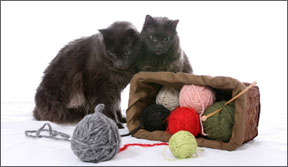Ever since one of your beloved cats died several weeks ago, youve been feeling pretty down. People who have been through the same experience tell you this is normal after such a loss. But then you notice that your other cat is eating a lot less, doesnt play like he Bev Caldwell 288 used to and wanders around the house, yowling, as if he was looking for his lost companion. Do cats grieve like we do? And if so, are there things we can do to help them? Animals and Emotions. Its only within the last ten years or so that scientists have begun to recognize that animals lead rich emotional lives. There is evidence that cats and other animals experience emotional responses to significant changes in their environment – and this includes going through the grieving process after the loss of feline or human companions. “What is important for people to realize is that the same brain neurochemistry that allows humans to feel is the same neurochemistry that many animals have – including cats. Cats can mourn,” says Katherine Houpt, VMD, PhD, the James Law Professor of Behavior Medicine at Cornell Universitys College of Veterinary Medicine. Signs of Grief. We once thought that all cats could be happy as loners, and many apparently are. But experts now believe that animals derive benefit from the companionship of other cats, just as humans need each other. The bond between cats or other animals – and humans – can be intense. When this bond is broken through death or separation, the surviving cat may go through a real grieving process. Cats may act differently during grief just as humans do because it is an individual process. But there are some common behaviors that you may notice. These include loss of regular appetite (even to the point of fasting); changes in sleep patterns; lack of play; excessive howling or becoming very silent; staring out the window for periods of time; and even wandering aimlessly around favorite spots of the deceased companion. Your cat may cling to you or may prefer to be alone. According to Dr. Houpt, mother cats may grieve for their kittens if the kittens meet an untimely death, or if they are taken away very early (usually less than six weeks after birth). The best thing to prevent a mother cat from grieving is to let her wean her kittens naturally, if thats possible. When to Start Anew. You may be tempted to get another cat right away, but its usually best not to rush into replacing the pet youve recently lost. Wait until your cats signs of grief resolve and she has regained her former energy. And you should also wait until your own grief has subsided. When the whole family – that includes humans and cats – seems emotionally ready, then its time to introduce a new feline member to the household. “One study has shown that there are fewer problems when introducing a female cat,” says Dr. Houpt. “If you are going to try to introduce a new companion, make sure that the cats are introduced very gradually to each other, and that their first meetings are always associated with positive events – feeding, attention, play.”



